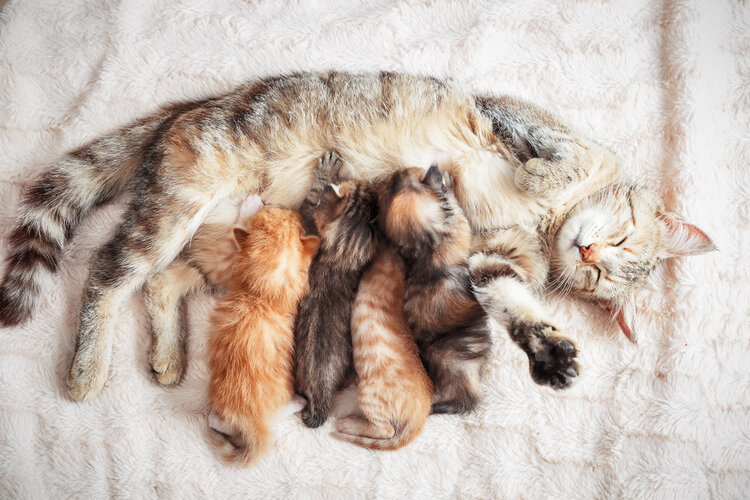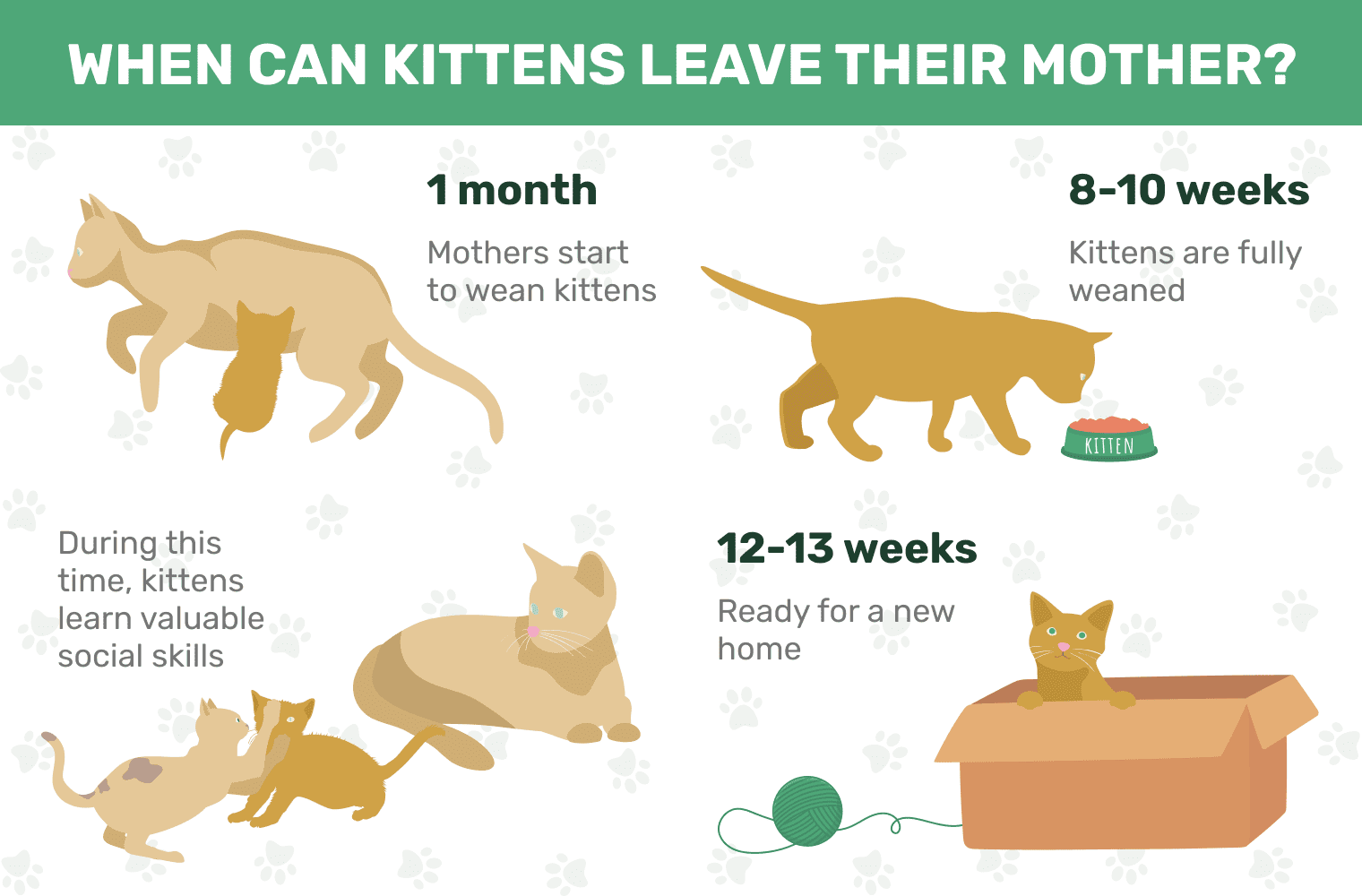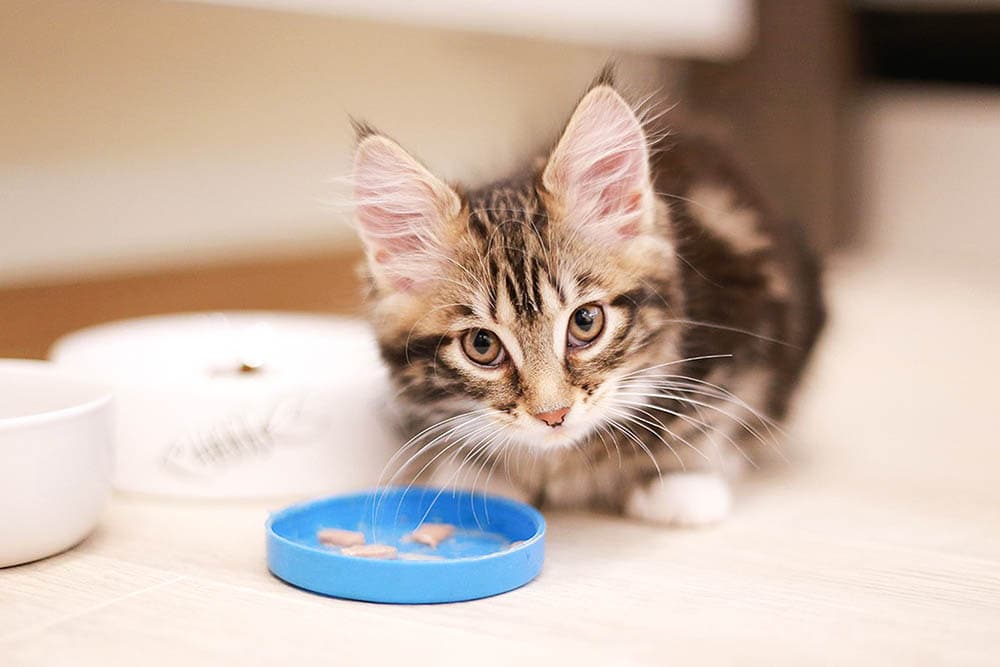
People commonly believe that kittens can leave their mothers at eight weeks of age, and this misconception is supported by the fact that this is the age when most breeders rehome their cats. However, kittens that do leave their mothers at this age are more likely to suffer developmental problems, and they are unlikely to have learned essential skills like socialization and litter training.
It is, therefore, best to leave the kittens with their mother until they reach 12 weeks of age.
By this time, it will have learned to toilet in an appropriate place, gained some independence from its mother and littermates, and its immune system will be fully developed. It should also have had its vaccinations. It may mean waiting an additional four weeks before you can take your kitten home, but it will be worth the wait to enjoy a better developed, better socialized, and more independent young cat.
 Kitten Development – 2 weeks
Kitten Development – 2 weeks
A kitten is dependent on its mother for everything during the first four weeks. They provide milk, ensure the kitten urinates and defecates properly, and they keep their young out of harm’s way. A very young kitten cannot manage its own body temperature, so they even rely on mum to keep them warm or cool them down, as required. They are also born with their eyes closed so mum will act as their eyes.

Kitten Development – 3 to 7 weeks
By four weeks, the kitten will have opened its eyes and started to move around a little, although only on shaky legs. At this stage, the kitten will learn to walk unaided and will start to develop the skills that are needed to hunt, survive, and even use the bathroom. They even start to learn some basic communication skills. Mum also corrects inappropriate behavior, therefore teaching your future kitten how to behave well.
If the kitten is going to be rehomed, this is the best time for the new owners to meet the kitten, although contact should be fairly limited and typically occurs in view of mum.

Kitten Development – 8 to 12 weeks
By eight weeks of age, the kitten should be weaned onto solid food. Mum’s milk will dry up, although this does not mean that the kitten no longer has use of her and some kittens may continue to drink mum’s milk until they reach ten weeks of age. Mum will continue to train her kitten and correct bad behavior. She will teach her to use the litter tray and help her with early socialization skills.
By 12 weeks of age, most kittens will be ready for rehoming and being separated from their mum. Some kittens benefit from being left with their mother for an additional two weeks, however.

Kitten Development – 3 to 6 months
Between three and six months, your kitten will start to put on weight. It will lose its baby belly and start to become more muscular. Some cats can reach sexual maturity by the time they reach six months of age, although it will usually take a little longer than this with most breeds. Kittens may undergo spaying or neutering at the six-month stage.
Kitten Development – 6 to 12 months
During this stage, your kitten is transitioning through its teenage period and into young adulthood. If your kitten has any baby teeth left, they will disappear by about eight months. Your vet may recommend having any remaining baby teeth removed when they are spayed or neutered. Cats of this age will start to explore more and will gain confidence and they may start to look for lap time and cuddles with you and other family members. By the time your cat reaches ten months, you should gradually move them onto an adult food to prevent too much weight gain and to ensure that your adult cat is getting the right balance of vitamins and minerals to be healthy and fit.
When a cat reaches one year of age, it is considered an adult cat, although it may still show some kitten tendencies.

Will Your Kitten Miss It’s Mother?
Kittens forget their mothers quite quickly once separated. This might seem harsh to humans, but it is a survival trait that serves wild cats very well. Once it has developed hunting skills, the kitten will leave its litter and go looking for a mate and its own territory. If it were to miss its mother, the kitten would stay in the same area, leading to competition for food and the potential for inbreeding with littermates.
It is also beneficial for domestic cats because it means that the kitten can go to its new home without suffering any kind of emotional trauma. It may take a day or two, but this is usually the only time it takes before your kitten has moved on.
Conclusion
Many breeders and owners say that kittens are ready to leave their mothers when they are eight weeks of age. However, it is better to leave a kitten until it is twelve weeks old. By this stage, it will have been fully weaned, will have a good understanding of using a litter tray, and will have gained independence from the rest of its litter. A kitten’s immune system is also better developed by 12 weeks, which means that there is less chance of illness and developmental issues.
You can meet the kitten at a younger age but try to leave it until three months before you take it to its new home.
See also:
- Is It True That Male Cats Kill Kittens? The Surprising Answer
- Will a Mother Cat Abandon Her Kittens If Touched By Humans? Vet Reviewed Facts & FAQ
Featured Image Credit: yasuspade, Shutterstock


 Kitten Development – 2 weeks
Kitten Development – 2 weeks



